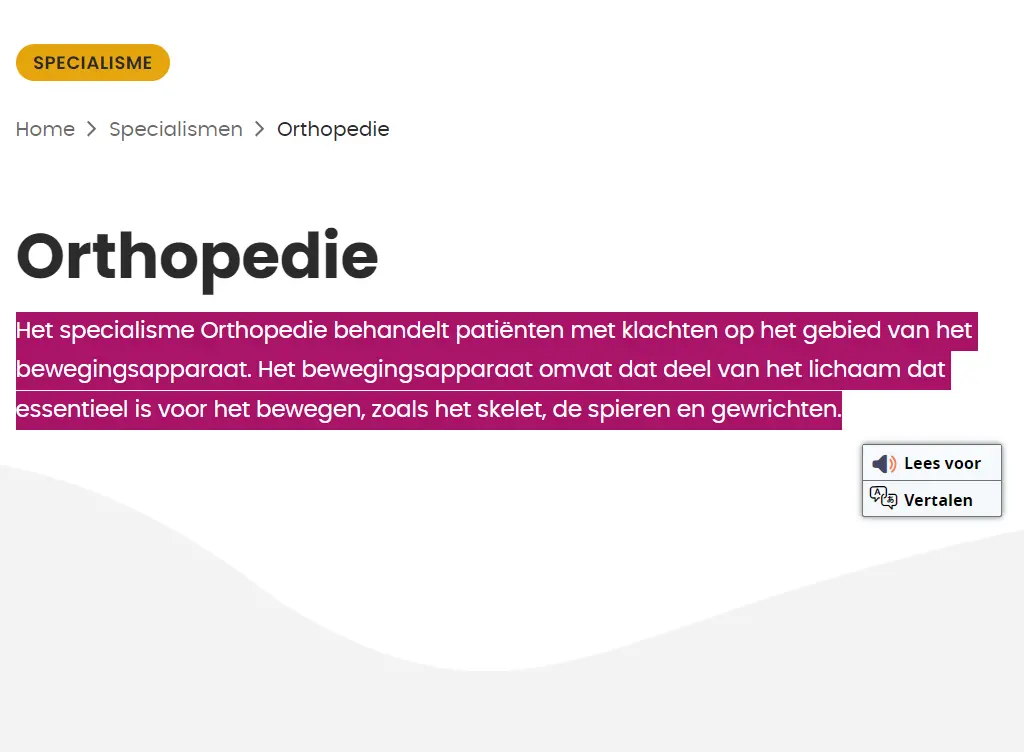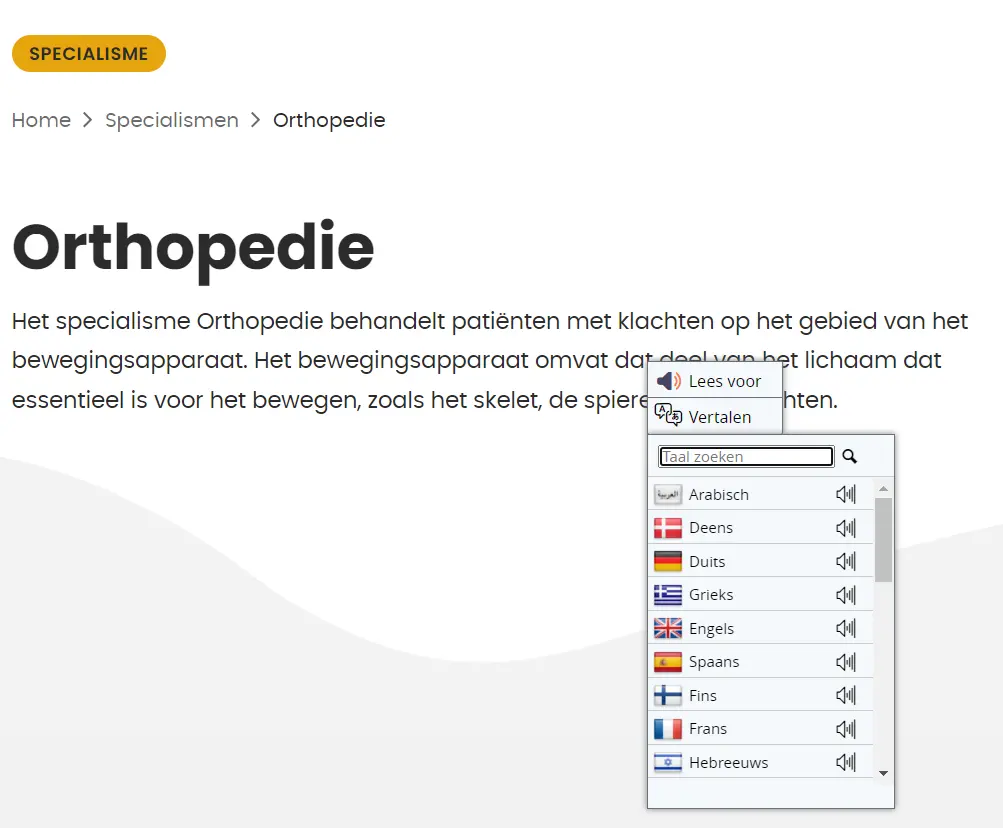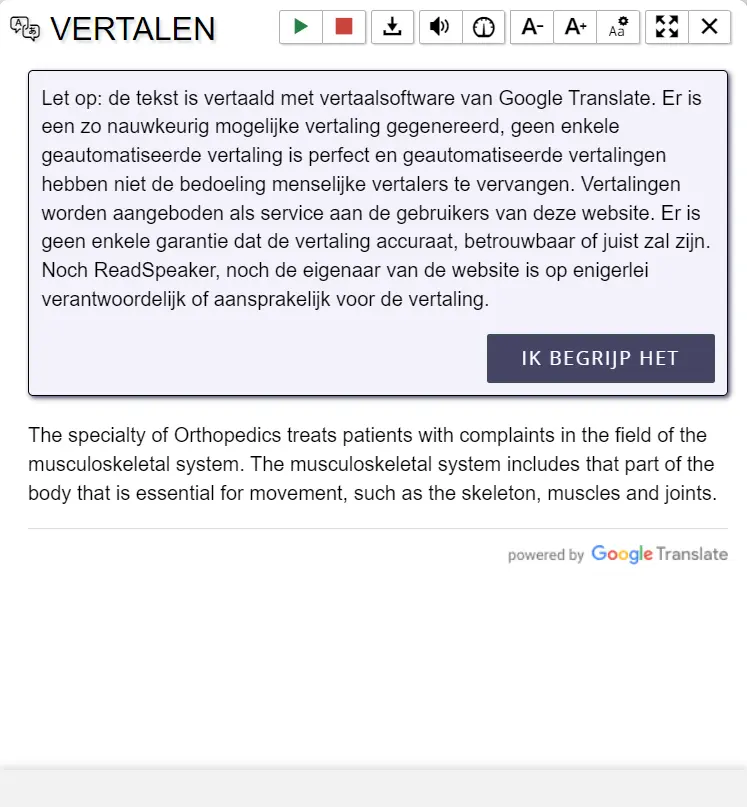Introduction
You or your loved one have just been admitted to the unit.
The Intensive Care Unit is abbreviated as the ‘ICU’. Intensive Care means precisely what it says. Patients on the ICU receive the urgent care that they need. These include intensive-care patients, medium-care patients and patients who had an operation. This document contains information about what you, your relatives or your loved ones can expect during this time on the ICU.
Who Works on the ICU?
Intensive Care Unit
The ICU has two units, each containing eight beds. Patients on this unit are monitored and treated 24 hours a day by specialised doctors and nurses. These care professionals do everything they can to help seriously ill patients through a critical, sometimes life-threatening period. Admission to the ICU is a major event that can be very unexpected for the patient and his or her family and loved ones.
The Attending Doctor
The intensivist — the primary practitioner for you, your relative or your loved one — is a medical specialist who’s available on the ICU 24 hours a day.
The intensivist bears ultimate responsibility for the medical care of you, your relative or your loved one during the stay on the ICU. In addition to intensivists, ward doctors also work on the ICU.
The ward doctor, who is present 24 hours a day, will examine you, your relative or your loved one. If necessary, other medical specialists will be consulted for advice and treatment.
Other Specialists on the ICU
Other care providers also work on the unit. Physiotherapists are present everyday, for example, and the dietitian is always involved. If necessary, other ancillary care providers may also be involved, such as a speech therapist.
Spiritual Care Provider
An ICU admission has a significant impact on you, your family and your loved ones. It can raise questions about life, about what you value and much more.
If you or your loved ones have questions or need a sympathetic ear, the Spiritual Care Services can provide support.
Let the nurse know if you’d like to speak to a spiritual care provider.
Patient Care
Patient Allocation and Care
You or your loved one will be cared for by a regular nurse each shift. Should you or your loved one have any questions, this charge nurse will be your primary point of contact during the shift. You can discuss any needs you may have with this nurse.
Monitoring Equipment
Every patient room on the ICU is outfitted with monitoring equipment. You or your loved one will be connected to this equipment while staying on the ICU. This equipment images and monitors the patient’s heart rhythm, blood pressure, breathing and oxygen levels via a monitor. If necessary, the patient’s bodily functions will be supported or taken over.
The equipment regularly emits signals, such as flashes or beeps. This does not necessarily mean that anything is wrong. The nurses know precisely what needs to be done.
The nurses are always aware about the information related to you or your loved one’s monitoring, even when they’re not in the room.
Camera Surveillance
The patient rooms on the ICU may be equipped for camera surveillance. The camera’s images can only be viewed by nurses at their station on the ICU. The images are not recorded or saved.
Medications and Therapies
The care provided on the ICU may include various medications and other forms of therapy and/or treatment. Example treatments include physiotherapy, speech therapy or respiratory support.
Your or your loved one's medication will be carefully monitored every day and adjusted, if necessary. The intensivist, ward doctor, nurse and the hospital pharmacy will work together to monitor your medication. The medication, depending on the type, will be administered by intravenous infusion (also referred to as IV drip) an injection or in tablet form.
The ICU therapies that you or your loved one need, such as ventilation and/or sedation, will also be assessed on a daily basis. These therapies will be tapered down or phased out as soon as possible.
Additional Testing and/or Examinations
You or your loved one’s admission to the ICU and subsequent care requires special attention. It takes time to initiate treatment and carry out additional testing, such as blood tests and X-ray examinations. That is why, during your visit, we might ask you to temporarily take a seat in the waiting room. We’ll let you know as soon as you can rejoin your relative or loved one. Thank you for your understanding in this matter.
Restraint Measures
Sometimes, we have to apply restraint measures to patients while they are on the ICU. These measures limit your or your loved one's freedom of movement, but they are only implemented to prevent patients from injuring themselves. They will, of course, be handled with the utmost care.
Multidisciplinary Consults
Multidisciplinary consults, which are held on a daily basis, are a chance for medical professionals to discuss your or your loved one's condition and treatment plan. In addition to the intensivist, ward doctor and the charge nurse, other doctors also attend these consultations. The attendees may include surgeons, internists, pulmonologists, pharmacists and microbiologists.
Informed Consent
The medical care and nursing provided on the ICU ranges from relatively simple to highly complex. The standard care offered on the ICU is comprised of several different treatments. It’s not always possible to talk to you, when necessary, about every individual treatment. See the 'Informed Consent on the ICU’ leaflet for a lengthier explanation about the standard treatments offered on the ICU.
When patients want to be treated on the ICU, we operate on the assumption that they’ve also consented to these standard ICU treatments. You or your loved one are free to refuse certain treatments, such as blood transfusions. You can discuss any potential refusal with the nurse or attending intensivist.
Provision of Information
Legal Representative and Contact Person
The intensivist will keep you or your loved one informed about your/their medical condition. For example, he or she will provide information about the diagnosis, potential examinations, the treatment as well as the short- and long-term expectations. Legally, only the doctor has a treatment relationship with the patient. ICU patients, however, are not always able to actively participate in conversations or make important decisions about their treatment. Therefore, when you or your loved one is admitted, we make an agreement about who’ll act as the contact person for the patient.
The primary contact person can always call the unit to enquire about your or your loved one's condition. The ICU is available by telephone 24 hours per day. We request that you do not telephone, if possible, between 7.00 and 10.30am. During this block of time, we’re busy with our care round. After 10.30 am, the doctors will have made their rounds, which allows us to provide more information about the medical treatment.
The ICU telephone number can be found at the end of the document, under the section titled ‘Access to Intensive Care’.
During a visit, the primary contact can speak to the charge nurse on shift about general matters, for an additional conversation and for any other questions.
We kindly ask that the primary contact person pass on the information received to the other family members and/or acquaintances as we’re not allowed to provide them with medical information.
However, we’d also like to have the telephone number of a secondary contact person. We’ll only use the secondary contact person’s telephone number if the primary contact person cannot be reached.
Personal Data
Data Storage
Medical data are recorded in the patient’s electronic file. Medical records are kept for several reasons to help ensure continued appropriate care. As a patient, you or your loved one will often interface with several care providers. In which case, sharing patient data between care providers is not only desirable, but often necessary.
We operate on the assumption that you consent to important information being shared with the relevant care providers.
Once you or your loved one no longer have to stay on the ICU, a discharge letter will be sent to your GP and co-practitioners.
Various medical data are also included, anonymously, in evaluations to improve the quality of the care. Some data are also incorporated into the annual report and in scientific case note reviews.
The Patient Portal ‘mijnVieCuri’
Visit the patient portal to view your medical data in a secure digital environment. You can view letters from your GP, as well as test and examination results, to help you prepare for your appointment with your specialist at the outpatient clinic.
Advance Care Directive
If you have an advance care directive, we recommend that you make it available to your family and GP.
An advance care directive is a written statement about the medical treatment you want or do not want and your end-of-life wishes.
In non-acute, new care situations, it’s fine for you as a patient to discuss the content of your advance care directive with your care providers. Speaking to them will ensure that they’re aware of what you do and do not want in terms of care.
In acute situations, it’s not possible for care providers to search for or request an advance care directive. Which means that, in these moments, there’s a risk that things will be done differently than you, as a patient, would like.
As a patient, you have the right to refuse treatment, to refuse to participate in research or to withdraw your consent. The specialist will inform you of their consequences.
Interpreting Services for Non-Dutch Speakers
If you do not speak Dutch, the ‘interpreter phone’ can be used. The speakerphone enables several people to listen or talk at the same time. An interpreter can help you and the care providers better understand one another.
Hospital Rules & Regulations
Visiting the ICU
To visit your loved one on the ICU, you must first report to the secretary or ring the bell via the intercom. After ringing the bell, you will be let in as soon as possible. We kindly request that you do not walk in unannounced with other visitors or staff members.
The ICU has daily visiting hours
from 2.00 to 3.00pm and from 6.30 to 8.00pm.
Visits outside of these times are only possible in consultation with the ICU nurse.
The visiting hours indicated above may be deviated from in certain circumstances.
No More than Two visitors Per Patient
For the peace and quiet of the patients, please visit with no more than two people at any given time. Should there be more visitors, they can alternate and wait in the ICU’s waiting room.
Family Rooms
There are two family rooms available on the ICU.
Your family member or loved one may be in critical condition. If that’s the situation, the nurse and/or intensivist may advise you not to leave and to remain vigilant.
The ICU regulates both how the family rooms are allocated and how long are used. The room’s access badge should never leave the ICU. In general, we recommend that family members sleep and eat at home.
Hospital Visits with Children
Would you like to bring your children? If so, please consult the nurse. Visiting an ICU patient can make a big impression on a child.
It certainly can be done, but it calls for extra attention and proper guidance.
Exit Ticket
Starting from the third day on the ICU, the primary contact person can
receive a parking pass to park free of charge.
You may ask the charge nurse for this parking pass, which
is valid for the duration of the ICU admission.
Personal Items
Do not bring money or any valuables to the ICU. Any jewellery belonging to you or your loved one will be handed over to the designated contact person.
We do ask, however, that you bring toiletries, glasses, dentures, hearing aids, slippers or shoes and possibly music or something to read.
No Plants or Flowers
Photos and drawings are always permissible on the ICU and may be hung up. Plants and flowers are not allowed on the ICU.
Mobile Phone Usage
Visitors to the ICU are not allowed to use a mobile phone. Visitors may place phone calls in the ICU’s waiting room.
Patients are sometimes permitted to use their mobile phone. Please discuss this with the charge nurse.
Complaints
Please let us know if you have any complaints during your stay on the ICU. If you’re unsatisfied with how we handle your complaints, you can also contact the hospital's Complaints Officer via the reception desk in the main hall or via the website.
ICU Aftercare
ICU Journal
A great deal happens during your or your loved one’s admission to the ICU. The clinical picture and treatment required may cause unexpected and prolonged symptoms for you or your loved one. This may provoke questions and/or a desire on the part of family members to talk about their experiences. We try to provide you, your loved one and other concerned parties with the necessary support through conversations. Journalling about the time spent on the ICU can help you maintain an overview of your situation. You received an ICU journal in your welcome package.
Post-Intensive Care Outpatient Clinic
The ICU has a post-intensive care outpatient clinic that offers a counselling session for patients after their discharge. This helps people process their period of illness during their stay on the ICU.
An ICU return day is organised each year, during the third quarter, for patients who have been on the ICU, as well as their loved ones. Connecting with those who’ve undergone the same experiences can help you or your loved one to process and accept all that happened on the ICU.
Closing thoughts
During an ICU admission, we do our utmost to provide you and your loved ones with the best possible guidance.
Do you have any questions after reading this information?
If so, you can always approach the nurse or intensivist on the ICU with your questions.
Questions
If you have any questions after reading this leaflet, please discuss them with the
nurses or the attending specialist.
Access to Intensive Care
Venlo Location
Intensive Care
|
Route Number 87 |
via the K Towers lift, 2 nd floor |
|
Unit 2, beds 9 – 16 |
|
|
Unit 3, beds 17 – 24 |
|
You/your loved one are/is in room: _________
Vragen
Heeft u na het lezen van deze informatie nog vragen? Stel uw vragen tijdens het eerstvolgende bezoek of bel naar:
Contact
Opmerkingen
Ziet u een typfout, een taalkundige fout, of heeft u moeite met de leesbaarheid?
Ziet u teksten of afbeeldingen met auteursrechten die wij niet hebben vermeld?
Stuur een e-mail naar communicatie@viecuri.nl en we zoeken een passende oplossing.
Disclaimer
Deze informatie is algemeen en geen behandeladvies. De informatie is ook geen vervanging van de afspraken die tussen patiënt en zorgverlener zijn gemaakt. VieCuri kan niet aansprakelijk worden gesteld voor schade als gevolg van mogelijke onjuistheden. Bekijk hier de uitgebreide disclaimer.
 +31 (0) 77 320 57 85
+31 (0) 77 320 57 85

